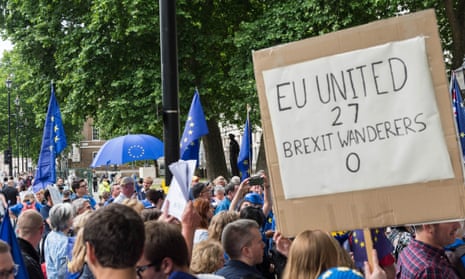It has been a tumultuous time. Last Friday a deal was struck that may well allow talks between the British government and the EU to progress to a second stage. But still there are widely diverging views about what should happen in the future.
Today I publish the terms of withdrawal from the EU (referendum) bill, which aims to provide a referendum on the negotiated EU exit package to give voters the final say on Brexit. I, and the majority of my constituents in Swansea West, voted remain in the 2016 referendum. My view immediately after the result was that Brexit was a horrific mistake, that what Brexit promised would not be delivered, and that remains my view today.
In the week following the referendum, I tabled a bill calling for a referendum to give people the final say on the exit package, with an option to continue our EU membership if voters believed their reasonable expectations for Brexit hadn’t been realised. But it’s only recently that this idea has gained traction. Last week a poll by Survation – which correctly predicted the 2017 election results – found that more than half of voters support a referendum on the EU exit package, and recently the Labour front bench also appeared not to rule out a referendum. Meanwhile, the author of article 50 has confirmed that it is not too late to reverse the process, if the government is willing. A referendum on the exit package could pull us out of the fire.
John Maynard Keynes said: “When the facts change, I change my mind. What do you do?” British voters are reasonable and pragmatic, and I believe they can be trusted to look at the facts and make a reasonable assessment.
It’s time to look again at the facts. This week the Brexit secretary, David Davis, admitted to parliament’s Brexit select committee that the government has not produced a single economic impact report on Brexit – despite demands from businesses across the country who are desperate to know their fate.
Voters I speak to on the doorstep are increasingly realising they have been conned. “This isn’t what I voted for,” many tell me. The promises of Brexiteers such as Nigel Farage and Boris Johnson have turned out to be nothing but barefaced lies. The £350m per week promised to the NHS, and the pledge of single market access are only the tip of the iceberg. We now know that the divorce package alone is likely to cost the UK government up to £50bn. This is before the other economic costs are taken into account, including rising inflation due to a weak pound, tariffs on trade, and job losses resulting from investment moving elsewhere. In the past month firms ranging from technology manufacturers to investment banks have signalled their intention to move out of the UK; the European Banking Authority is off to Paris, the European Medicines Agency to Amsterdam – and Brexit has not even happened yet.
On the political side, Theresa May’s party is in complete disarray, disagreeing on more or less every single issue related to Brexit. Both the PM’s party and my own cannot agree on what they want Brexit to look like – and many MPs (if not most) don’t want to leave at all.
The only way to resolve this, for the sake of all our futures – including those of Jeremy Corbyn and Theresa May – is to put the decision back into the hands of the people. They should have the last word on whether the deal on the table resembles the promises they voted for, and whether the emerging costs and uncertainties make it better to maintain the status quo of staying in the EU.
This week’s debacle – and eventual concession – over a hard border in Ireland highlighted how fragile May’s position is: she is subject to the last-minute whims of the DUP, and unable to command a majority in parliament. Mercifully, we have scraped through to the second phase of negotiations on trade, but the worst is yet to come, and the clock is ticking: the package has to be agreed not only by London and Brussels, but also 27 EU member states. “The show is now in London,” said the European commission last week – Brussels has made its stance clear, but the government can’t seem to decide what it wants.
Undeniably, the facts have changed since June 2016: only a fool would say otherwise. My bill offers a blueprint for a way out of this mess: by giving people the final say, the government would allow the British people to choose between its negotiated arrangement and the option of reversing article 50 and remaining in the EU. This honours the will of the people. But it also honours the economic and political reality that is increasingly catching up with our leaders in Westminster.
